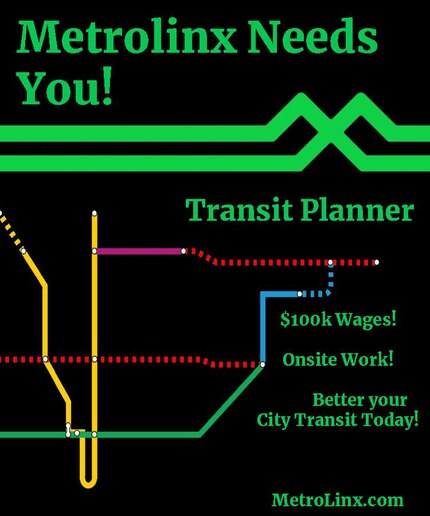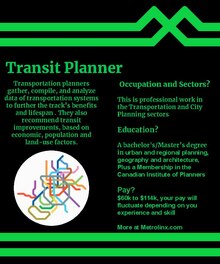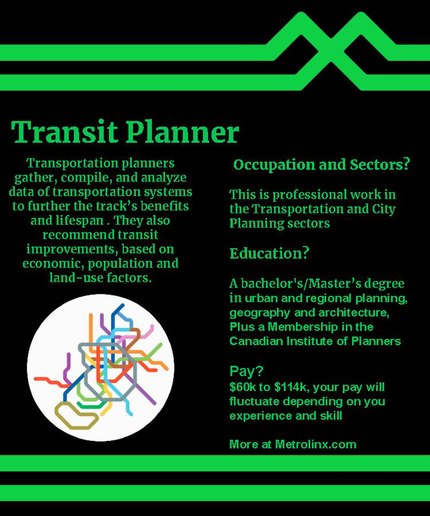User:Dargananddrago/Transportation planner(Fake)
 Author: Weiner, Edward. Urban transportation planning in the United States : an historical overview : final report. | |
| Occupation | |
|---|---|
| Names | Transport Planner, Transportation Planner,Transit Planning Director,Transit Planner |
Occupation type | Professional |
Activity sectors | Transportation, City Planning |
| Description | |
| Competencies | "knowledge of arithmetic, algebra, geometry, and calculus"[1] , analytical skills, and critical thinking |
Education required | A bachelor's degree in urban and regional planning, geography, architecture,A master's degree in one of these disciplines may be required. Membership in the Canadian Institute of Planners is usually required. Membership in a provincial planning institute may be required in some provinces.[2] |
Fields of employment | Building and Plannings, Constructions |
Related jobs | Urban planner Landscape architect Civil engineer |
This is not the real wiki for Transport Planner, It's just an assignment. the real one is here : Transportation planning[3]
Transportation planners gather, compile, and analyze data to study the use and operation of transportation systems. They develop transportation models or simulations.They also recommend transportation system improvements or projects, based on economic, population, land-use or traffic projections.
- Myblueprint(Transportation Planner Overview)[2]
Task 1/Career Profile:
[edit]TASK 1: Choose a career in the field of geography:
[edit]The following is a list of possible careers. You must sign up with Ms. Genua to ensure we do not have any repeat presentations.
| Medical Geographer, Seismologist, Geologist, Geographic Information Systems Officer, Emergency Services, Climatologist, Map Librarian, Remote Sensing Analyst, Habitat Researcher, Urban Planner, Food Security Consultant, Hazardous Waste Planner, Demographer, Environmental Consultant, Recycling Coordinator, Real Estate Developer/Sales, Community Developer, Hydrologist, Transport Planner, Outdoor Recreation Management, Travel/Tourism Planning, Wetlands Conservationist, Resource Management Specialist, Conservation Education Coordinator, Landscape Architect, Pollution Control Consultant, Ecotourism Planner, Soil Conservationist, Cartographer, Map Analyst, Waster Management, Forestry Technician, Environmental Impact Assessment, Landscaper, Wildlife Technician, Conflict Manager/Management (ex. Land, culture, etc.). |
Nine Existential Questions:
[edit]1. What responsibilities does this occupation involve? Provide a description of the job. :
[edit]
The job of a Transport planner is basically what you think it is " The man the plans transportation", But it's a lot more nuanced then that.
They plan not just the usual Train and bus lines, but also walk paths and even air routes[1]. They work with government officials and usually in the private sector[2]. They need practical experience in engineering, science and technology[1]. They need to consider the safety, the environment, and efficiency of a route while tackling issues[1]. They Usually write reports on routes, detailing problems and proposals for the said route[1]. They are the middlemen, between the manufacturer and the group on site building new tracks[1]. They allocate resources, also answer questions from the public and Shareholders[1].
The job is described as "stressful" and "tiresome"[1]. After all to put it bluntly, you have the power change everyone in the city's transporting lives and every mistake is pointed at you.
2.What kind of education/training is required for this occupation? :
[edit]
The education required is quite high considering the amount of money Transit Planners they get payed. A university degree is required and some non-Uni stuff(at least in Canada)[2]. A bachelor's degree in Regional planning, Geography, and Architecture is needed. A Master's degree in these fields is also common for Planners, plus a degree in Civil Engineering is also common it doesn't seem mandatory in Canada[4][5].
The Canadian Institute of Planners is a professional organisation for anyone involved in land use planning[6]. Their mission is to quote "To advance and raise the profile of Canadian professional planning, for our members in Canada and abroad, through leadership, advocacy, expertise, and education"[7]. Membership to the organisation or their many provincial branches is not necessarily mandatory but useful none the less.
3.What geographic knowledge and skills would you need to work in this occupation? :
[edit]This section is already covered in previous and upcoming sections, but the main gist is that Transport planners have to study an area's demographics, climate and area type to find a compelling solution to a problem or shape out a new track. they also have to plan recourse management to further the efficiency of the metro/company.

4.What kinds of technology are used in this occupation? :
[edit]Planners use a multitude of Tools to further better/maintain a track/line. Archived data on a track to monitor it's conditions, performance and issues[8]. Regional Traffic Models to monitor a region demographics, most used transit systems and traffic heavy streets/areas to come up with region specific transit plans[8].Sketch Planning tools to illustrate an early version of new transit strategies[8]. They are useful in evaluating strategies and weighing the impacts if you should go forward with it[8]. Simulations tools to simulate traffic pattern and behaviour[8]. They are useful in evaluating strategies on a smaller section of road/track but could also be useful on a regional scale[8]. All in all, the tech planners use are there to help with the planning,process and execution of a strategy to better a specific track, street or area.
5.What is the typical salary for this occupation? What factors alter this salary (i.e. Who is paid more? Who is paid less? ) :
[edit]The average salary from planner to planner is extremely different, ranging from $60k to $114k in Canada and $49k to $123k in the U.S[2][9].Average Wages in Canada stay mostly the same province to province at $60k to $80k or $90k[2]. State level wages are also pretty similar except for Virginia at an unusual high average of $109.9k while Idaho is unusually low at $52.7k[9].
But the other main driver is the a planner's seniority. A starting level planner will only make $24 an hour with Top level is making over 50[9]. The staggering deference in wages could be the fact that Transport Planning is a extremely important job in the transportation space, governments would of course be careful with how much money their giving to someone who can drastically change the industry.
Another is skill level, A planner with strategic planning skills is making $8k more that planners with just Excel skills(at least in Canada)[10][11]. All in all a planner's skills and experience and area of work combined give us the staggering differences in planing wages.
6 & 7.What interpersonal skills are required for working in this occupation?What other personal interests and characteristics are important for working in this occupation? :
[edit]There are 5 things most planners have.Reading comprehension: planners have to understand bulky documents and papers on a line to make knowledgeable conclusions on how to better it[2].Writing & Speaking: planners have to convey their ideas to supervisors in a way that seems reasonable, factual and informative talking gets people's attention[2].Critical thinking: using logic and reasoning to come up with solutions to transport problems and compering all down sides and upsides to see if you should go forward with it[2]. Judgement and decision: evaluating lines based on efficiency and costs and evaluating how much to company could benefit if you go forward[2]. Some others are:

- numeracy skills and the ability to interpret data[12]
- written and oral communication skills[12]
- problem-solving and analytical skills[12]
- confidence in dealing with a range of people [12]
- the ability to communicate complex ideas and issues clearly and accurately[12]
- project management skills[12]
- the ability to work as part of a team[12]
- computer literacy[12]
- an interest in transport and urban planning issues[12]
Personality wise, planners are hard working, optimistic, careful and calm so any city breaking transit problem is fixed in no time. The job is stressful but also appears to be enjoyed by planners. At least outside the U.S, where the job is rated 2.8 stars and is in the lower 15% of careers in america[13].
8.Who is a well-known person in this career? Or Have there been any discoveries in this career that have been in the news? :
[edit]
I wasn't able to find a "well-known" transit planner but there are a few less known. Eric Chu is a transit planner at the Toronto transit commission who used to work at York region in Markam He graduated from Waterloo's Faculty and environment Institute, more information is here[14][15].
Wayne Carter is a Go expansion manger at Metrolinx[16]. By his words "My job consists primarily of overseeing the design and construction of transit infrastructure, ensuring that capital projects are delivered on time and on budget[16]. As someone who commutes via the GO Train every day, I have a firsthand understanding of what impact my work has on the public at large"[16]. he comments that Metrolinx has a "family environment" and gives "true sense of satisfaction" seeing the real world impacts of his work[16].
Some others include Marcus Merry and Becky Cox[17][18].
9.Where did you find this information? Include a WORK CITED page with all of your sources in proper. :
[edit]All Sources are listed in the reference section of this wiki article, but some sources just go to the actually website front page so I'll list them here.
- MyBlueprint refers to the entire section on Transport planning in the "Occupation section" of the "Work tab".
- CareerExplorer also refers to all the sections listed on the right side of the website page.
Task 2, 5 min presentation(Advertisement) :
[edit]

Task 3, Info graphic :
[edit]
References
[edit]- ^ a b c d e f g h "What does a transportation planner do? - CareerExplorer". www.careerexplorer.com. Retrieved 2022-01-05.
- ^ a b c d e f g h i j "myBlueprint". app.myblueprint.ca. Retrieved 2022-01-04.
- ^ "Transportation planning", Wikipedia, 2022-01-03, retrieved 2022-01-04
- ^ "What education do transportation planners have? - CareerExplorer". www.careerexplorer.com. Retrieved 2022-01-09.
- ^ "Transport planner job profile | Prospects.ac.uk". www.prospects.ac.uk. Retrieved 2022-01-10.
- ^ "Canadian Institute of Planners", Wikipedia, 2021-09-18, retrieved 2022-01-09
- ^ "www.cip-icu.ca".
{{cite web}}: CS1 maint: url-status (link) - ^ a b c d e f "Transportation Planning and Analysis Tools: Selecting the Right Tools to Optimize Outcomes - FHWA Office of Operations". ops.fhwa.dot.gov. Retrieved 2022-01-10.
- ^ a b c "Transportation planner salary ‐ CareerExplorer". www.careerexplorer.com. Retrieved 2022-01-10.
- ^ "Transportation Planner with Microsoft Excel Skills Salary in Canada | PayScale". www.payscale.com. Retrieved 2022-01-10.
- ^ "Transportation Planner with Strategic Planning Skills Salary in Canada | PayScale". www.payscale.com. Retrieved 2022-01-10.
- ^ a b c d e f g h i "Transport planner job profile | Prospects.ac.uk". www.prospects.ac.uk. Retrieved 2022-01-10.
- ^ "Are transportation planners happy? - CareerExplorer". www.careerexplorer.com. Retrieved 2022-01-10.
- ^ Cool Job - Transit Planner at the TTC, retrieved 2022-01-10
- ^ "Waterloo's Faculty of Environment - YouTube". www.youtube.com. Retrieved 2022-01-10.
- ^ a b c d "Why Work For Metrolinx: Greater Toronto Top Employer | Metrolinx". www.metrolinx.com. Retrieved 2022-01-10.
- ^ "Transport planner: Becky Cox | Prospects.ac.uk". www.prospects.ac.uk. Retrieved 2022-01-10.
- ^ "Transport planner: Marcus Merry | Prospects.ac.uk". www.prospects.ac.uk. Retrieved 2022-01-10.
External links
[edit]| This is not a Wikipedia article: It is an individual user's work-in-progress page, and may be incomplete and/or unreliable. For guidance on developing this draft, see Wikipedia:So you made a userspace draft. Find sources: Google (books · news · scholar · free images · WP refs) · FENS · JSTOR · TWL |

